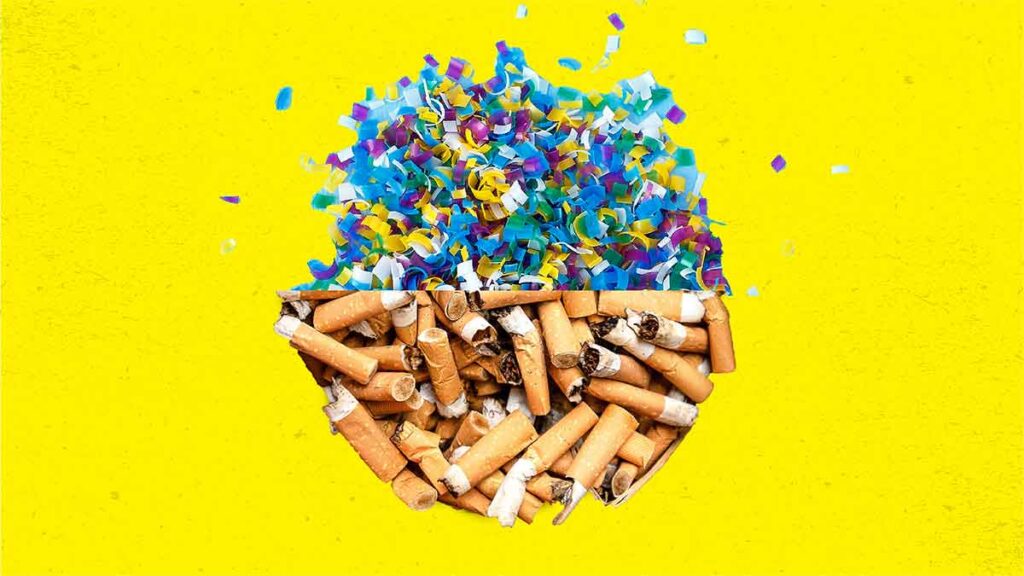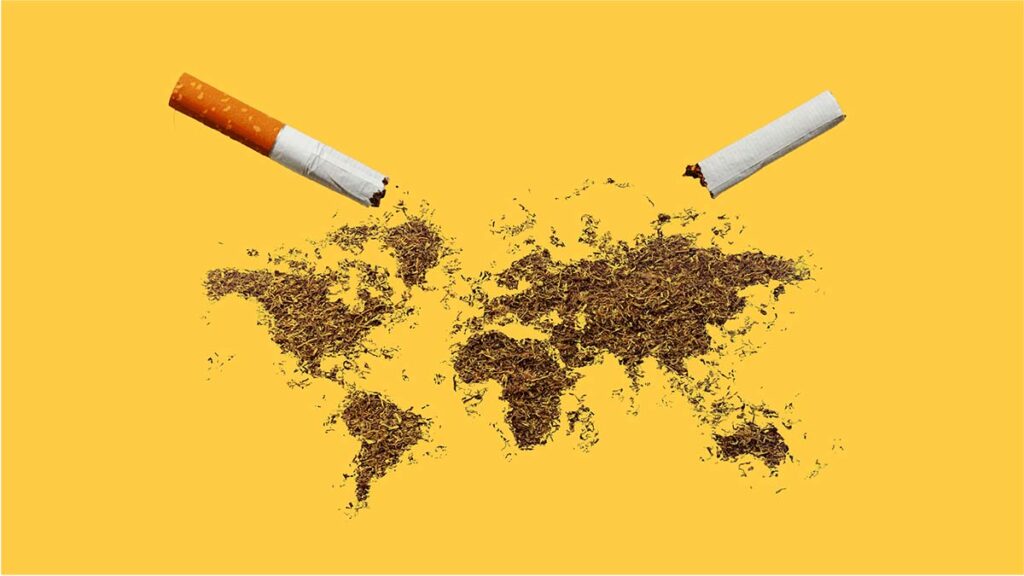In 2023, tobacco companies tried to portray themselves as socially responsible, environmentally focused organizations that are changing for the better. STOP’s network of academic and public health organizations including Vital Strategies, however, shone a spotlight on the business activities the industry doesn’t want the public to focus on. The truths that STOP uncovered in 2023 show that the industry’s claims of transformation can’t be taken seriously.
1. Netflix streamed more than one billion minutes of programming that contained British American Tobacco and Philip Morris International branding.

Even though F1 cars are no longer emblazoned with cigarette ads, tobacco industry branding is alive and well in the global racing sport. During the 2022 racing season, instead of advertising cigarettes, British American Tobacco promoted addictive e-cigarettes and nicotine pouches and Philip Morris International advertised a corporate campaign. Both companies’ sponsorship targeted F1’s young, global and growing audience.
This tobacco industry-related branding was seen on Season 4 of Netflix’s series, “Formula 1: Drive to Survive.” The concerning trend: Tobacco companies’ sponsorship dollars are going further than ever, thanks to Netflix, e-sports and other digital media that extend the tobacco companies’ reach. Read the report.
2. Tobacco companies successfully lobbied for the end of bans on e-cigarettes, heated tobacco products and/or nicotine pouches in Egypt, Kenya and Uruguay.
The 2023 Global Tobacco Industry Interference Index, produced by the Global Center for Good Governance in Tobacco Control, revealed a worsening trend in industry meddling in health-related policies. This meddling included successful efforts by the industry to end some bans on newer tobacco and nicotine products.
The Index, which uses civil society data from 90 countries, ranks countries based on their governments’ efforts to fend off tobacco industry inference in policymaking. The latest edition showed a disheartening deterioration in countries’ scores for more than half (43) of the 80 countries analyzed in the 2021 report, while only 29 improved their score.
While some governments, such as those in Botswana, Bosnia and Herzegovina, Burkina Faso and Cote d’Ivoire, made progress in protecting their policies from industry influence, many other governments succumbed to industry tactics. This emphasizes the need for governments to fully implement Article 5.3 of the global tobacco treaty, the Framework Convention on Tobacco Control.See how your country ranked.
3. The tobacco industry introduces new, cheaper brands to prevent people from quitting when tobacco taxes increase.
New work from researchers at the University of Bath revealed that the tobacco industry has developed numerous tactics to fight the effects of increased tobacco taxes, which are proven to reduce tobacco use. For example, to blunt the effects of higher tobacco prices caused by increased tobacco taxes, the industry introduces new brands or products that are cheaper, so consumers “downshift” to more affordable products instead of quitting.
Other industry tactics uncovered in the STOP report include providing coupons or discounts to offset tax-related prices increases, offering fewer cigarettes per pack instead of increasing the price, gradually increasing prices so rises in costs are less noticeable and more. Read the summary or the full report.
4. Cigarettes are single-use plastics and should be regulated as such.

In 2023, STOP publicized an often-overlooked fact: Filters, found in nearly all commercial cigarettes, are made of plastic. With 8.5 million cigarette butts being disposed of every minute, cigarettes are considered the most common type of plastic litter worldwide.
The STOP campaign “Cigarettes = Plastics” emphasized that cigarette butt litter is more than unsightly: Cigarette butts leach toxins into the environment and their plastic filters break down into microplastics. The campaign also dispelled a common myth: Cigarette filters do not actually provide health benefits to smokers. The campaign called for governments to categorize and regulate cigarettes for what they are: dangerous single-use plastics that bring no benefit to people.
Watch the video.
See the infographic.
5. While Big Tobacco makes billions in profits every year, tobacco farmers in Malawi reported being trapped in a cycle of poverty.

The tobacco industry often tries to portray tobacco growing as a lucrative venture and reports that tobacco farmers are thriving. A new, first-of-its-kind film produced by the Tobacco Control Research Group at the University of Bath and STOP shows the other side of this narrative.
The film “Tobacco Slave” highlights the stories of four farmers growing tobacco in Malawi, who shared in their own words what it’s really like working within the contract system. The farmers relayed stories of earning little to no profit and being unable to hire help, thus creating the need for family members and children to help grow and harvest tobacco. The film also looks at the past and current colonial business practices of major tobacco companies, showing the evolution of tobacco industry activities that have created the market conditions occurring today.
6. Single sticks make inequity worse.

At first glance, selling single cigarette sticks, not as part of a pack, may seem unrelated to systemic inequity. But a new STOP fact sheet reveals how interrelated they really are. The Single Sticks Fact Sheet explains the threats single sticks pose to public health—such as hooking people with limited incomes, including young people—and how their sales contribute to systemic inequity.
For instance, tobacco use diverts money away from necessities like healthy food, education and housing. The sale of single sticks plays a role in perpetuating tobacco addiction among those who may otherwise quit when a full pack of cigarettes becomes unaffordable. Thus, money needed elsewhere continues to be spent on tobacco products. A STOP blog post about the negative effects of single stick sales in Bangladesh illustrates how this may play out in a tobacco-consuming household.
7. The Foundation for a Smoke-Free World claimed to support work in LMICs, but much of its money went to groups in HICs.
Founded and fully funded by Philip Morris International (PMI), the Foundation for a Smoke-Free World (FSFW) is an established ally of the industry. Alongside the announcement of a new CEO, FSFW also recently reported it was severing financial ties with PMI. Simultaneously, FSFW received a cash windfall from the cigarette maker of more than US $122 million—effectively funding its work at the rate of US $17.5 million per year until 2029.
A deeper dive into FSFW’s annual tax returns revealed more inconsistencies between its rhetoric and its actions. Despite claims to prioritize work in low- and middle-income countries, researchers found that significantly more has been spent on grantees in high-income countries. In 2022 alone, it spent nearly US $24 million on grants in high-income countries and regions, but just US $2.48 million in low- and middle-income countries.
Read STOP’s FSFW tax return analysis.
Even though cigarette sales are slowly declining in most parts of the world, the tobacco industry is as active as ever in trying to get new customers hooked on its addictive products. Much of its work—whether it’s attempting to influence health policies in its favor or marketing to young people—happens behind the scenes. With the ongoing collaboration within STOP’s network, STOP will continue shining a light on the truths the industry works so hard to hide.
Get Our Latest Public Health News
Join our email list and be the first to know about our public health news, publications and interviews with experts.